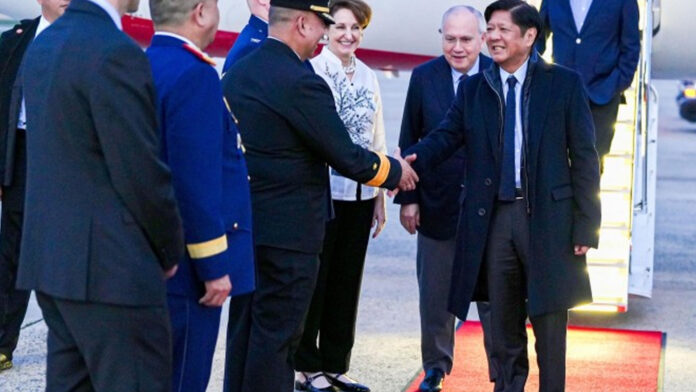Speaker Martin Romualdez on Thursday said the historic trilateral summit between the United States, Japan, and the Philippines would be an “unequivocal” display of President Ferdinand R. Marcos Jr.’s leadership and foreign policy stance of being a friend to all and an enemy of none.
In a statement, Romualdez said the outcomes of the trilateral summit would affirm the country’s commitment to fostering strong and mutually beneficial partnerships with key allies like the United States and Japan.
“This historic summit is an unequivocal recognition of President Ferdinand R. Marcos Jr.’s leadership, bringing the Philippines to the forefront of regional cooperation and diplomacy,” Romualdez said.
President Marcos arrived in Washington, D.C. on Wednesday night (US time) for the trilateral meeting with US President Joe Biden and Japanese Prime Minister Fumio Kishida to enhance the economic and maritime cooperation of the three countries.
He said the Philippines plays a pivotal role in the trilateral summit in advancing peace and prosperity in the Indo-Pacific region.
He particularly noted that the recognition of the Philippines as an important partner by both the United States and Japan is a clear indication of the nation’s growing influence and strategic significance in the region.
“The historic meeting of US President Joe Biden, Japan Prime Minister Fumio Kishida, and President Ferdinand R. Marcos, Jr., marks a significant milestone in regional diplomacy as it reaffirms the Philippines’ role as an essential ally in promoting stability, security, and economic development across the Indo-Pacific,” he said.
He said the Philippines’ constructive role in regional affairs entails maintaining open dialogue, fostering trust, and building strong partnerships with nations committed to promoting peace and prosperity in the Indo-Pacific.
Romualdez is confident that the summit will provide huge economic dividends in terms of job creation as well as lucrative business opportunities for the Filipino people, in addition to closer collaboration among the three countries.
He said the House of Representatives is committed to supporting President Marcos’ initiatives for the promotion of regional stability, security, and economic progress, which are essential in the realization of his vision to uplift the lives of the Filipino people.
“President Marcos Jr. can count on the unwavering support of the House of Representatives for his initiatives to promote peace through rules-based order and diplomacy and spur economic development for the benefit not only of the Filipino people but of the greater international community,” he said.
Before leaving Manila on Wednesday, Marcos said he would highlight the importance of enhancing the Philippines’ economic cooperation with Japan and the US “with a view to promoting economic resilience and security.”
Marcos intends to explore ways of advancing cooperation, especially in the areas of critical infrastructure, semiconductors, digitalization and cybersecurity, critical minerals, renewable energy, and defense and maritime cooperation.
The Chief Executive is also expected to exchange views with Biden and Kishida on various regional security issues of mutual concern, including the importance of upholding the rule of law and preserving the rules-based international order in the Indo-Pacific region.
‘Rising stature’
Chairman of the House Committee on Muslim Affairs Rep. Mohamad Khalid Dimaporo said the acknowledgment of the Philippines as a key partner by the US and Japan “is a testament to our nation’s rising stature and its contributions to regional stability, security, and economic development.”
Dimaporo, representative of the Lanao del Norte first district, said the trilateral meeting reaffirms the Philippines’ position as an “essential ally” in the Indo-Pacific.
He said President Marcos’ effective foreign policy approach of being “a friend to all and an enemy to none” has elevated the position of the Philippines on the regional stage, adding that his leadership has fostered strong partnerships and facilitated regional cooperation.
Davao Oriental 2nd District Rep. Cheeno Miguel Almario said the Philippines’ active participation in the summit “demonstrates our commitment to fostering strong alliances and promoting regional stability.”
“This event marks a significant step forward in our efforts to strengthen diplomatic ties and enhance cooperation in the region,” said Almario, a member of the House Committees on National Defense and Security and on Strategic Intelligence.
Meanwhile, Lanao del Sur 1st District Rep. Zia Alonto emphasized the summit’s strategic significance for the Philippines, saying the country, situated in the heart of the Indo-Pacific, plays a “crucial role” in shaping the region’s future.
“The trilateral summit underscores our nation’s growing influence and underscores the importance of collaborative efforts in addressing regional challenges and pursuing shared objectives,” said Adiong, also a member of the House Committee on National Defense. (PNA)






